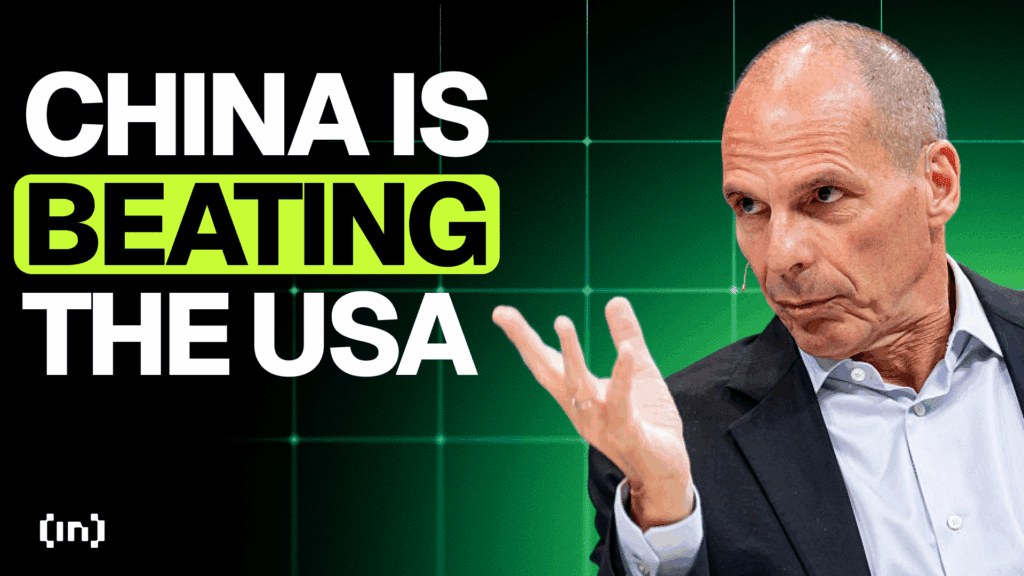By passing the GENIUS Act, the United States demonstrated its commitment to building a stablecoin-based economy. Through this initiative, we aim to strengthen the dollar’s global dominance. But Yanis Varoufakis believes it spells disaster.
In an exclusive interview with BeInCrypto, the Greek economist and former finance minister warned that the bill could trigger a financial crisis even worse than 2008. Against this background, he argues that China’s more state-controlled and disciplined approach to economic power is in a better position.
Sponsored Sponsored
Washington Stablecoin Power Play
Since the end of the Bretton Woods era, the United States has maintained its global dominance primarily through financial power and the hegemony of the dollar.
But this advantage, once supported by a strong industrial base, has evolved as America’s manufacturing capacity has declined. Today, Washington’s influence relies instead on two pillars: Silicon Valley’s command of Big Tech and the dollar’s control over international payments.
This ability to route most global transactions through the US financial system gives Washington immense influence. This allows the country to impose sanctions, finance deficits at low cost, and maintain geopolitical influence.
“If you want to send money from anywhere to anywhere, it has to go through the dollar system…That’s why[the US]uses sanctions as a weapon against people it doesn’t like, for better or for worse,” Varoufakis told BeInCrypto, adding: “What makes America strong, not great, is the hegemony of the dollar. And they know that if they lose that, they’re done.”
Currently, the US is turning to stablecoins to strengthen the dollar’s dominance.
A new strategy for dollar management
In November 2024, American economist Stephen Milan, a close ally of President Trump and currently a member of the Federal Reserve Board, introduced an economic framework known as the Mar-a-Lago Accords.
The core of this plan involved a controlled devaluation of the dollar to reduce trade deficits and revive U.S. manufacturing while preserving the currency’s role as the world’s foreign reserve standard.
“On the one hand,[Milan]wants to reduce the exchange value of the dollar. On the other hand, he wants to maintain the dollar as the world’s main payment system,” Varoufakis explained.
Sponsored Sponsored
The GENIUS method is closely aligned with this vision. By supporting a regulated stablecoin economy, we effectively extend the dollar’s dominance and strengthen America’s financial power through crypto-based infrastructure rather than traditional banking.
But Varoufakis says this approach is dangerously short-sighted.
When stablecoins are at total risk
Varoufakis warned that allowing banks and private issuers to build and pilot a stablecoin economy would strengthen the very dynamics that have long defined the U.S. system: a Wall Street-driven government structure.
“We know that the Federal Reserve is not an independent central bank. It is independent from the American people and from Congress, but it is completely dependent on JPMorgan and Goldman Sachs… Its role is to do a little bit of regulation, nothing that bothers Wall Street too much,” Varoufakis explained.
He argued that the deepening privatization of economic power leads to system fragility.
Sponsored Sponsored
If a major stablecoin were to collapse due to mismanagement, speculation, or a crisis of trust, the effects would ripple across borders. Foreign economies using dollar-backed tokens have no recourse as they cannot print dollars to stave off panic.
“As we speak, companies in Malaysia, companies in Indonesia, and companies here in Europe are increasing their use of Tether… This is a big problem. All of a sudden, these countries… have central banks controlling the money supply. So their ability to conduct monetary policy is reduced, and that creates instability,” Varoufakis added.
Such a failure could set off a chain reaction reminiscent of the Great Recession. Varoufakis warned that this amounted to a self-inflicted global crisis. It is caused by America’s efforts to digitize its financial empire and outsource it to the very institutions that once brought it to the brink of collapse.
“When the whole thing goes pear-shaped, like it did in 2007-2008, there will be second- and third-generation effects that will negatively impact the United States. So I think this will be the next financial crisis coming from the stablecoin market.”
China, by contrast, has built a state-coordinated financial and technological ecosystem designed to prevent just such instability.
China’s controlled capitalism works
Varoufakis said that while the U.S. government caters to Wall Street, China’s bankers and technology leaders cater to the state. Private companies are allowed to make profits, but they operate within strict limits set by the government.
Sponsored Sponsored
“You might call this authoritarianism, but I call it wise,” he said.
Varoufakis said China’s integration of Big Tech and finance is noteworthy. Platforms such as WeChat Pay and the digital renminbi have established a unified and efficient payment network that operates under state supervision.
In contrast, this model cannot be easily replicated in the United States, with Wall Street firmly in its way. Integrating digital payments with credit and banking can undermine control over the financial system.
“You may remember that Mark Zuckerberg tried to introduce his own cryptocurrency on Facebook a while back and was bashed by Wall Street with the help of the Fed,” Varoufakis explained.
He further emphasized this difference, arguing that although the United States has advanced technology, there is no clear direction and private monopolies dominate. As a result, although it remains technologically strong, it is politically bogged down and unable to modernize or build effectively.
“For me, China’s understanding is right, and America’s understanding is… sensationally wrong… I believe that if Adam Smith, the father of free market capitalism, were alive today, he would agree with what I say. He would be appalled by what is happening in Washington and New York,” Varoufakis stressed.
In his view, this difference will define the future struggle for global economic power and ultimately determine which systems survive.


